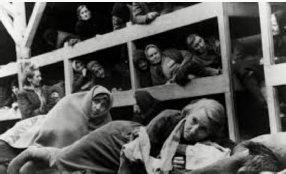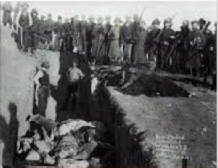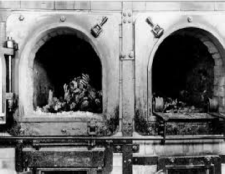|
CLICK BUTTON TO GO |
|
|
|
|
|
|
|
|
|
|
|
|
|
Videos |
|
|
|
|
|
|
|
|
|
|
|
|
|
PART 1 T O P I C |
|
|
|
|
|
|
|
|
|
|
|
|
|
|
|
|
|
|
JewishWikipedia.info
THE
STORY OF THE JEWISH PEOPLE
INCREDIBLE
GENOCIDE - HOLOCAUST MEMORIAL DAY - 27 JANUARY
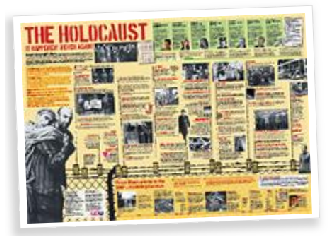
The UCU Holocaust Memorial Day wallchart has been brought up to date and includes new sections about the recent fight against fascist organisations like the BNP and EDL. This resource can be used in your institution to educate against the dangers of
anti-Semitism, fascism and
racial discrimination.
HOLOCAUST WALL CHART
WHY THE HOLOCAUST MEMORIAL DAY IS IMPORTANT
We have to honour those who showed bravery in the face of the supreme moral test that was the Holocaust, s
ays the (British) Secretary of State for Foreign Affairs
Jewish Chronicle, 25 January 2018
This year’s Holocaust Memorial Day marks the 73rd anniversary of the liberation of Auschwitz-Birkenau. I know that many readers of the Jewish Chronicle still bear ineradicable scars — mental and perhaps even physical — of Hitler’s attempt to eliminate world Jewry.
This government is determined that the genocide of six million Jews will never be forgotten. We will build a Holocaust memorial and learning centre beside Parliament to serve as a reminder of the depths to which humanity can sink, and the importance of standing together against bigotry and hatred.
When the Holocaust began, there were some who had the moral courage to act. This week at the Foreign and Commonwealth Office we posthumously honoured eight people with Hero of the Holocaust medals. Among them were British diplomats who together saved thousands of Jews by issuing the travel documents that allowed them to escape the Nazis. John Carvell in Munich, Sir George Ogilvie-Forbes and Margaret Reid in Berlin and Sir Thomas Preston in Lithuania did whatever they could to help Jews to reach safety.
But, in truth, not enough people followed their example: only a relative handful responded to what was a supreme moral test. And seven decades later, we cannot say that antisemitism, the oldest of hatreds, has been eradicated. Nor can we claim that genocide is a thing of the past.
As recently as 2016, the United Nations concluded that Daesh had inflicted the “crime of genocide” on the Yazidi people in northern Iraq.
Even today, the truth about the Holocaust is distorted and sometimes denied. The most grotesque comparisons are drawn between Zionism and Nazism, including by public figures who should know better.
Hence the resounding importance of the commemoration this year; the tragedy is that it remains profoundly necessary.
WHY MARK THE HOLOCAUST MEMORIAL DAY (HMD)?
Holocaust Memorial Day Trust (HMD)
Holocaust Memorial Day (HMD) takes place on 27 January each year (the date on which Auschwitz-Birkenau, the largest Nazi concentration and death camp, was liberated by the Red Army) and is a time to remember the millions of people murdered during the Holocaust, under Nazi Persecution and in the genocides which followed such as in Cambodia, Rwanda, Bosnia and Darfur.
Holocaust Memorial Day is a time when we seek to learn the lessons of the past and recognise that genocide does not just take place on its own - it’s a steady process which can begin if discrimination, racism and hatred are not checked and prevented. We’re fortunate here in the UK; we are not at immediate risk of genocide. However, discrimination has not ended, nor has the use of the language of hatred or exclusion. There is still much to do to create a safer future and HMD is an opportunity to start this process.
HMD activity organisers bring together the diverse strands of their communities to commemorate Holocaust Memorial Day in their neighbourhoods. This is a real demonstration of how the lessons of the past can inform our lives today and ensure that everyone works together to create a safer, better future.
Each year thousands of activities take place for HMD, bringing people from all backgrounds together to learn lessons from the past in creative, reflective and inspiring ways. From schools to libraries, workplaces to local authorities, HMD activities offer a real opportunity to honour the experiences of people affected by the Holocaust and genocide, and challenge ourselves to work for a safer, better future.
Holocaust Memorial Day Trust Testimonies of Holocaust and genocide survivors
Bosnian genocide UCU download commemorates the 20th anniversary of the Bosnian genocide [2Mb]
To commemorate the 20th Anniversary of the Bosnian genocide (1995-2015), we produced a short publication outlining the events that led to the murder of around 8,000 men and boys. The single largest mass murder in Europe since 1945: Keep the memory alive:
Remembering Rwanda UCU download Holocaust Memorial Day 2014 [187kb]
To commemorate the 20th Anniversary of the Rwandan genocide (1994-2014), we produced a short publication outlining the events that led to the slaughter of an estimated 1 million Tutsis and moderate Hutus over a period of 100 days from 7 April to 16 July 1994. The testimonial of Jean Bosco Ngabonzima delivered to UCU members in 2011 has also be reproduced.
Holocaust Memorial Day suggested reading UCU download [214kb]
Marking Holocaust Memorial Day (HMD) in schools has a huge impact on young people.
Click the link above for education resources.to help your school get involved and mark Holocaust Memorial Day. HMDT provides a range of assemblies, lesson plans and activities to help your students learn about the Holocaust, Nazi Persecution, more recent genocides and contemporary issues.
Our free resources contain everything you need to get involved with HMD, even if you are new to teaching this subject.
Our resources aim to help students to:
Learn more * Feel empathy * Be inspired to take action
If you have any questions about our education resources please email [email protected] or call 020 7785 7029.
Further teaching resources, support and ideas
The British Red Cross has a lesson plan and teaching ideas around Holocaust Memorial Day.
The UCL Centre for Holocaust Education has a Holocaust Education Development Programme which offers professional development and resources for teaching about the holocaust.
A teacher who benefited from the UCL programme has written a Guardian article on Transforming holocaust education with really interesting lesson ideas.
The United Nations Association – UK (UNA-UK) has a page with background information and teaching activities for this Day.
To find further teaching resources have a browse through those listed on our database with the keywords ‘holocaust’ or ‘genocide’.
BBC - Holocaust Memorial Day Resources A collection of resources to mark Holocaust Memorial Day on 27 January. ... what happened in Germany that led to the events of one of the darkest chapters of ...
The United States Congress established the Days of Remembrance as the nation’s annual commemoration of the Holocaust. Each year state and local governments, military bases, workplaces, schools, religious organizations, and civic centers host observances and remembrance activities for their communities. These events can occur during the Week of Remembrance, which runs from the Sunday before Holocaust Remembrance Day (Yom Hashoah) through the following Sunday.
Are you interested in organizing an observance? We’re pleased to offer a wide selection of resources featuring many themes and historical anniversaries that will help you find the most appropriate focus for your community. Resources at a Glance Commemoration Themes
(The internationally recognized date for Holocaust Remembrance Day corresponds to the 27th day of Nisan on the Hebrew calendar. It marks the anniversary of the Warsaw Ghetto Uprising. In Hebrew, Holocaust Remembrance Day is called Yom Hashoah. When the actual date of Yom Hashoah falls on a Friday, the state of Israel observes Yom Hashoah on the preceding Thursday. When it falls on a Sunday, Yom Hashoah is observed on the following Monday.)
LOCAL EVENTS - contact your town/city hall to find out what is going on and who is organising it. For ecample
Bedford Borough Council will carry out a multi-faith commemoration and host a series of events. Each year Holocaust Memorial Day encourages people to reflect upon the terrible consequences of the persecution that led to the Holocaust.
Oldham Evening Chronicle Saddleworth Peace Group The event is free and open to all.
The theme this year is the power of words and their capacity to make a difference, both for good and for evil.
Brighton and Hove City Council The theme for Holocaust Memorial Day 2018 is 'The Power of Words'. It provides the opportunity for everyone to learn the lessons from the Holocaust, Nazi persecution and in the subsequent genocides in Cambodia, Bosnia, Rwanda and Darfur.
Doncaster Council The theme is ‘Torn from home’ which encourages audiences to reflect on how the enforced loss of a safe place to call 'home' is part of the trauma faced by anyone experiencing persecution and genocide.
Sheffield City Council On HMD we share the memory of the millions who have been murdered in the Holocaust and subsequent genocides in Cambodia, Rwanda, Bosnia and Darfur in order to challenge hatred and persecution in the world today.
Birmingham City Council Holocaust Memorial Day commemorates the victims and survivors of the Holocaust and Nazi persecutions, as well as other genocides around the world.
The theme for this year’s event is ‘The power of words’, which asks people to think about how words can make a difference – both for good and evil – and how they have been used in the past and are used in the present.
RICHARD DIMBLEBY'S 1945 NEWS REPORT FROM BELSEN
WITH PHOTOGRAPHS
Miss Noble RMPS 2014 (13.05)
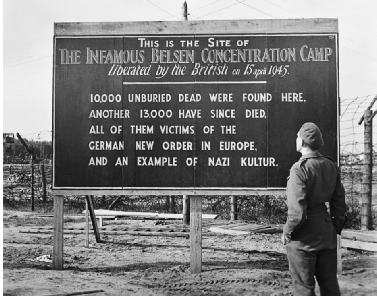 He was the BBC's war correspondent who accompanied the British 11th Armoured Division to the liberation of the Bergen-Belsen concentration camp, and described the scene in a report so graphic that the BBC declined to broadcast it for four days, relenting only when he threatened to resign:
He was the BBC's war correspondent who accompanied the British 11th Armoured Division to the liberation of the Bergen-Belsen concentration camp, and described the scene in a report so graphic that the BBC declined to broadcast it for four days, relenting only when he threatened to resign:
...Here over an acre of ground lay dead and dying people. You could not see which was which... The living lay with their heads against the corpses and around them moved the awful, ghostly procession of emaciated, aimless people, with nothing to do and with no hope of life, unable to move out of your way, unable to look at the terrible sights around them ... Babies had been born here, tiny wizened things that could not live ... A mother, driven mad, screamed at a British sentry to give her milk for her child, and thrust the tiny mite into his arms, then ran off, crying terribly. He opened the bundle and found the baby had been dead for days.
This day at Belsen was the most horrible of my life. Wikipedia
HOLOCAUST MUSEUMS
AND MEMORIALS
The Wiener Library, London
NEVER AGAIN: HEEDING THE WARNING SIGNS
United States Holocaust Memorial Museum 2013 (11.08)
The 2013 Days of Remembrance theme, Never Again: Heeding the Warning Signs, looks back at the events of 1938 and the momentous changes that were happening in Central Europe. Why did so many countries and individuals fail to respond to the warning signs? And what can we learn from the few who chose to act, despite widespread indifference? As we reflect on these questions, we remember all whose lives were lost or forever altered by the Holocaust. And we are Challenged to think about what might motivate us to respond to warning signs of genocide today.
For more information about Days of Remembrance 2013, please visit http://www.ushmm.org/remembrance/dor/....
JACK GUN: THE HOLOCAUST SURVIVOR
Maxwell Gun, 2016 (51.26)
This video is the recording of the precious life and times of the holocaust survivor Jack Gun from Rozyszcze, Poland. This is a rare recording of an unknown history.
The idea is to make a documentary from this video interview recorded at Michigan State University by Swarnavel Eswaran, Peter Johnston and Max Gun, the grandson of Jack Gun.
ISRAEL PAUSES ON
HOLOCAUST MEMORIAL DAY
ABC News 2016 )2.16)
A two-minute siren blared throughout the country this morning, signaling everyone
to observe a moment of silence.
HOLOCAUST
REMEMBRANCE DAY CEREMONY FROM YAD VASHEM 2017
Yad Vashem 2017 (1.35.42)
The central state ceremony marking the start of Holocaust Martyrs' and Heroes' Remembrance Day in Israel was held at Yad Vashem on Sunday night, April 23rd. The ceremony was held in the presence of the President of the State of Israel and the Prime Minister, dignitaries, survivors, children of survivors and their families,
together with the general public.
HOLOCAUST DAYS OF REMEMBRANCE CEREMONY
The Obama White House
The President speaks at the annual Days of Remembrance commemoration held at the Capitol
on April 21, 2009 (10.21).
UCU HOLOCAUST MEMORIAL DAY COMMEMORATION
UCU - University and College Union 2013 (26.57)
UCU is has produced a short film to commemorate the memories of the many who were murdered during the Holocaust. We would like to thank the UCU members who appear in this film and those who kindly submitted written testimonials about their family members
who were murdered during the Holocaust
HOW CAN LIFE GO ON -
HOLOCAUST MEMORIAL DAY 2017
UCU - University and College Union (3.39)
Moving testimony by John Fieldsend, a Kindertransport child, who reads the final letter to their children from his parents.
UJS is proud to engage a host of students, from a multitude of faith and non-faith backgrounds to partake in the commemoration of the Holocaust. The living memory of the Holocaust is paramount to the role UJS plays in the student community.
(Go to UJS to see video)
Our Living Memory
In 2018, UJS partnered with the Holocaust Educational Trust and NUS to launch ‘Our Living Memory,’ a project to extend Holocaust education and commemoration to students of all backgrounds across the country. This campaign aims to educate students about the events of the Holocaust, and encourage Students’ Unions to put on events for Holocaust Memorial Day, uniting the student world over an issue that has changed the course of history.
A social media campaign was launched in the two weeks leading up to Holocaust Memorial Day, featuring a series of survivor testimonies and videos with students from different backgrounds to highlight what remembering the Holocaust today means to them.
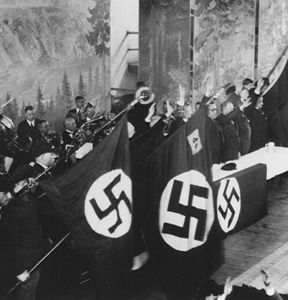
Since the end of the Holocaust in 1945
55 million civilians have perished
in more than 89 major genocides
around the world click here
